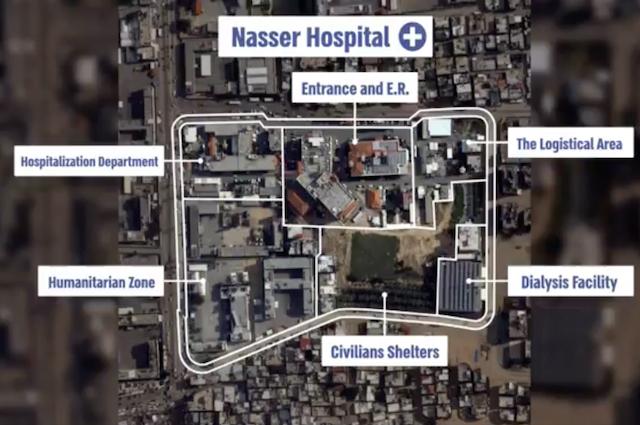Over four months have passed since the outbreak of violence on October 7, when Hamas militants launched an aggressive incursion into Israel, marking the beginning of what has escalated into the deadliest conflict in the region since the establishment of the Israeli state in 1948. Despite the fleeting respite provided by a short-lived ceasefire, which facilitated the release of over 100 hostages from Gaza, the confrontation has stubbornly persisted with no imminent resolution in sight.
The Israeli military's campaign against Hamas's infrastructure in the Gaza Strip continues unabated, further exacerbating the humanitarian crisis within the territory. A notable casualty of this conflict has been the Nasser Hospital in the southern city of Khan Younis, which, following an Israeli military operation to root out and eliminate the Hamas personell and infrastructure embedded inside of it, has ceased to function.
WATCH as a Hamas operative admits that Israeli hostages were being held at Nasser Hospital in Gaza and that Hamas terrorists hid behind civilians: pic.twitter.com/5bSg19O13r
— Embassy of Israel to the USA (@IsraelinUSA) February 18, 2024
The World Health Organization's Director-General, Dr. Tedros Adhanom Ghebreyesus, highlighted the dire situation by revealing that the health facility had been rendered inoperative. Efforts by a WHO team to access the hospital for assessing patient needs and delivering essential supplies were thwarted, despite their attempts to deliver fuel in collaboration with partners. Despite overwhelming evidence that Hamas and other terror groups have not only used hospitals to run their terror network, Ghebreyesus has so far ignored these facts.
Currently, the hospital is grappling with the challenge of caring for approximately 200 patients, including 20 in dire need of transfer to other medical facilities for urgent treatment. This crisis unfolds against the backdrop of Israel's assertion that it detained around 100 individuals at the hospital under suspicion of terrorism, including 20 accused of participating in the October 7 attack. The Israeli military has defended its actions, emphasizing its focus on locating the remnants of hostages within the hospital premises while ensuring that medical personnel and patients are not targeted. In similar situations during this campaign, the Israeli authorities helped move patients and provided equipment.
Over the past 24h, IDF soldiers:
— Israel Defense Forces (@IDF) February 18, 2024
🔺Continued to operate at the Nasser Hospital and located additional weapons.
🔺Located large quantities of weapons, explosive devices and RPGs, and conducted targeted operations on terrorist infrastructure in Khan Yunis.
🔺Eliminated approx.…
The situation at Nasser Hospital has been further complicated by the arrest of a significant number of its medical staff who were either directly or indirectly assisting Hamas, by the Israel Defense Forces (IDF), transforming the once vital health institution into what the Hamas-led Gaza Health Ministry describes as military barracks. This development has profound implications for Gaza's healthcare infrastructure, as Nasser Hospital is not only the largest operational medical facility in the Strip but also its second-largest hospital overall.
The IDF's operation in Nasser Hospital underscores the complex interplay between military objectives and humanitarian concerns, with both sides of the conflict presenting starkly different narratives. The ongoing hostilities have inflicted severe damage on Gaza's healthcare system, highlighting the urgent need for a resolution that addresses both the security concerns of Israel and the humanitarian needs of the Palestinian population in Gaza.


